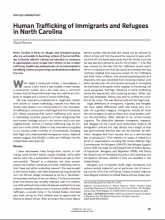Human Trafficking of Immigrants and Refugees in North Carolina
North Carolina is home to refugee and immigrant groups who are vulnerable to becoming victims of human trafficking. Culturally relevant training and education is necessary to appropriately serve foreign-born victims of sex or labor trafficking. Health care professionals can be instrumental in identifying victims and providing coordinated and collaborative care.
What might a restaurant worker, a housekeeper, a nanny, a farm hand, a hair braider, a hotel worker, a construction worker, and a bar maid have in common? Answer: Each of these individuals may very well be an immigrant or refugee and a victim of human trafficking.
We may experience professional or neighborly contact with victims of human trafficking, unaware that there are modern-day slaves in our communities. The “business” of trafficking is conducted in both legal and illicit industries. Falsely assuming that human trafficking only occurs in developing countries prevents us from recognizing that such human bondage occurs in our country and in our own neighborhoods. Victims of human trafficking may be citizens born in the United States or they may have immigrated to our country under a variety of circumstances, including both legal and undocumented immigration status. National reports suggest that 50,000 victims are trafficked into the United States each year.
Nsonwu, M. (2019). Human trafficking of immigrants and refugees in North Carolina. North Carolina Medical Journal March 2019, 80(2). Retrieved from https://doi.org/10.18043/ncm.80.2.101

